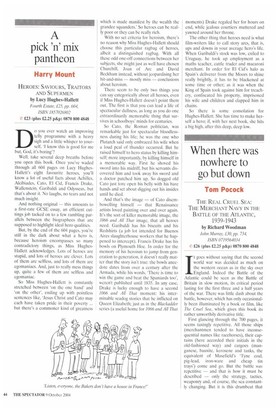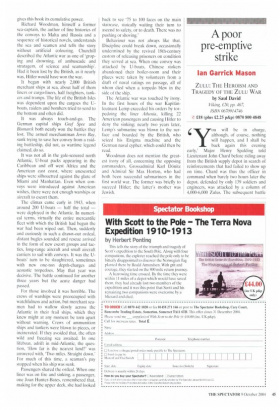When there was nowhere to go but down
Tom Pocock
THE REAL CRUEL SEA: THE MERCHANT NAVY IN THE BATTLE OF THE ATLANTIC,
1939-1943
by Richard Woodman John Murray, £30, pp. 734, ISBN 0719564034 rt, £26 (plus £2.25 p&p) 0870 800 4848 1 t goes without saying that the second world war was decided as much on the western ocean as in the sky over England. Indeed the Battle of the Atlantic could be seen as the Battle of Britain in slow motion, its critical period lasting for the first three and a half years of the war. There was little dash about the battle, however, which has only occasionally been illuminated by a book or film, like The Cruel Sea, which gives this book its rather unworthily derivative title.
First glancing through the 700 pages, it seems taxingly repetitive. All those ships (merchantmen tended to have inconsequential names like racehorses), their captains (here accorded their initials in the old-fashioned way) and cargoes (manganese, bauxite, kerosene and tanks, the equivalent of Masefield's 'Tyne coal, pig-lead, iron-ware and cheap tin trays') come and go. But the battle was repetitive — and that is how it must be described — only the strategy, tactics, weaponry and, of course, the sea constantly changing. But it is this drumbeat that gives this book its cumulative power.
Richard Woodman, himself a former sea-captain, the author of fine histories of the convoys to Malta and Russia and a sequence of historical novels, understands the sea and seamen and tells the story without artificial colouring. Churchill described the Atlantic war as one of 'groping and drowning, of ambuscade and stratagem, of science and seamanship'. Had it been lost by the British, as it nearly was, Hitler would have won the war.
It began with nearly 2,000 British merchant ships at sea, about half of them liners or cargo-liners, half freighters, tankers and tramps. The life of the British Isles was dependent upon the cargoes the Uboats, raiders and bombers tried to send to the bottom and often did.
It was always touch-and-go. The German capital ships Graf Spec and Bismarck both nearly won the battles they lost. The armed merchantman Jervis Bay, sunk trying to save her convoy from a raiding battleship, did not, as wartime legend claimed, do so.
It was not all in the gale-scoured north Atlantic, U-boat packs appearing in the Caribbean and off west Africa and the American cast coast, where unescorted ships were silhouetted against the glare of Miami and Manhattan. Even when convoys were introduced against American wishes, there were not enough warships or aircraft to escort them.
The climax came early in 1943, when around 200 U-boats — half the total — were deployed in the Atlantic. In numerical terms, virtually the entire mercantile fleet with which the British had begun the war had been wiped out. Then, suddenly and curiously in such a drawn-out ordeal, distant bugles sounded and rescue arrived in the form of new escort groups and tactics, long-range aircraft and small aircraft carriers to sail with convoys. It was the Uboats' turn to be slaughtered, sometimes with new one-ton depth-charges and acoustic torpedoes. May that year was decisive. The battle continued for another three years but the acute danger had passed.
For those involved it was horrible. The crews of warships were preoccupied with watchfulness and action, but merchant seamen had to wallow slowly across the Atlantic in their frail ships, which they knew might at any moment be torn apart without warning. Crews of ammunition ships and tankers were blown to pieces, or incinerated. If they avoided that, the often wild and freezing sea awaited. In one lifeboat, adrift in mid-Atlantic, the question, 'How far is the nearest land?' was answered with, 'Two miles. Straight down.' For much of this time, a seaman's pay stopped when his ship was sunk.
Passengers shared the ordeal. When one liner was on fire and sinking, a passenger, one Joan Hunter-Bates, remembered that, making for the upper deck, she had looked back to see '75 to 100 faces on the main staircase, stoically waiting their turn to ascend to safety, or to death. There was no pushing or shoving.'
Behaviour was not always like that. Discipline could break down, occasionally undermined by the revived 18th-century custom of releasing prisoners on condition they served at sea. When one convoy was attacked by U-boats, Chinese stokers abandoned their boiler-room and their places were taken by volunteers from a draft of naval ratings on passage, all of whom died when a torpedo blew in the side of the ship.
l'he Atlantic war was touched by irony. In the first hours of the war Kapitanleutnant Lemp exceeded his orders by torpedoing the liner Athenia, killing 22 American passengers and causing Hitler to deny the sinking; nearly two years later, Lemp's submarine was blown to the surface and boarded by the British, who seized his Enigma machine and the German naval cypher, which could then be read.
Woodman does not mention the greatest irony of all, concerning the opposing commanders, Grossadmiral Karl Donitz and Admiral Sir Max Horton, who had both been successful submariners in the first world war. The former was briefly to succeed Hitler; the latter's mother was Jewish.



















































































































 Previous page
Previous page